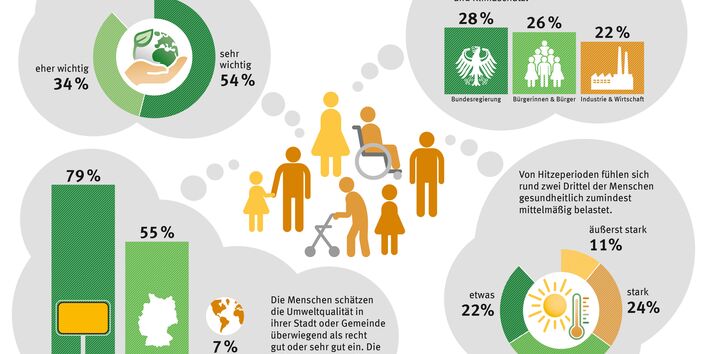Environmental awareness study: crises affect public’s perception of environmental and climate challenges
The majority of people in Germany continue to perceive both the environmental protection and climate change mitigation efforts as important. However, the topic continues to decline in relative perceived significance for the public. Many citizens consider problems in the health and education sectors more pressing — along with issues such as economic growth, public health, and war. However, when viewed in isolation, certain environmental protection issues remain highly important — and in some cases, are even growing in significance. These findings come from the German Environment Agency (UBA)’s current study on environmental awareness in Germany. The majority of those surveyed expressed more skepticism than ever on whether climate change and its effects can even be contained at this point. Similarly, they consider it essential to adapt to climate change— particularly for health reasons.
More than half of those surveyed (54%) find environmental protection and climate change mitigation very important. This quantity has, however, continually fallen in recent years. The protection of the environment and the mitigation of climate change were very important for 57% of those surveyed in 2022 and 65% in 2020. Additionally, the goal of limiting global warming to under 2 degrees celsius is losing support: only 57% find this goal very important— a whole 5% less than in 2022.
However, when participants were asked about specific and current environmental protection challenges, it was clear that the importance of such challenges remains at a high level or is even increasing. For example, the fight against plastic waste and species extinction, the safe disposal of nuclear waste and the protection of forests, moors and other ecosystems are considered slightly more important than two years ago.
UBA President Dirk Messner stated: ‘The scientific community agrees that we can only prevent further acceleration of climate change’s wide ranging effects for man, environment and economy by implementing climate protection quickly and consistently. Additionally we burden the coming generations with enormous costs and risks. We need climate action also as a strategy for ensuring prosperity and bolstering our quality of life. Climate and environmental protection urgently belong at the top of the political and public agenda.’
Effects of Climate Change: Shrinking Confidence
Optimism among Germans about the ability to cope with the effects of climate change is rapidly fading. Only a third of those surveyed are convinced that Germany can adequately manage the consequences of climate change. This number is the lowest in this time series since 2002
The survey shows that many people are already suffering from the following consequences of climate change: Two-thirds feel that their health is compromised during heatwaves. A quarter of those surveyed stated that their residence is without adequate protection from heat. An even larger portion worry that the situation will only worsen in the future. 85% see an obvious need for improving protection against extreme heat.
Environmental Effects on Health and Quality of Life
A positive result of the study is that the majority of people in Germany are happy with the condition of their local environment. More than 80% of those surveyed find the accessibility to greenspaces, the quality of drinking water and the cleanliness of their living environment satisfactory. In contrast, only 7% think that the global environment is in good condition.
For a further improvement of quality of life, respondents emphasised the need for the reduction of air pollution and the enhancement of local public transportation. Last but not least, the question of affordability plays a large role; 87% of those surveyed felt that the accessibility to climate-friendly and affordable housing needs to be improved.
When Opinion and Scientific Findings Diverge
The study results also show that people’s awareness of the topic is only partially impacted by scientific findings. Environmental research, for example, emphasises the precarious state of biodiversity , in conjunction with climate change, and its serious impact on agriculture and food systems. These complex environmental risks were underestimated by survey participants.
Additional Information:
The environmental awareness study, commissioned by the Federal Ministry for the Environment and the UBA, has been collecting representative data on the environmental attitudes and behaviour of Germany’s population every two years since 1996.
For the current study, a representative survey was conducted online in autumn 2024 among 2,552 citizens aged 18 and over. The design and assessment of the study was lead by the Institute for Ecological Economy Research (IÖW). The Verian Institute was commissioned to carry out the required fieldwork.

